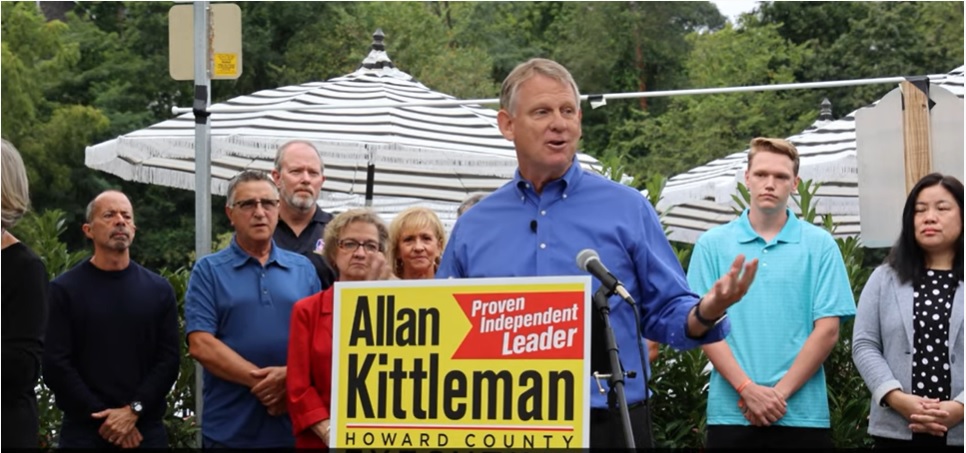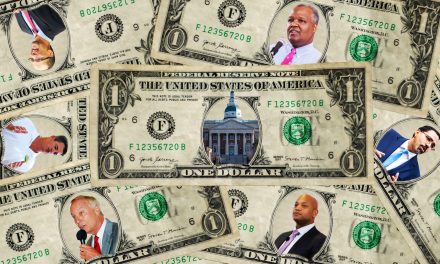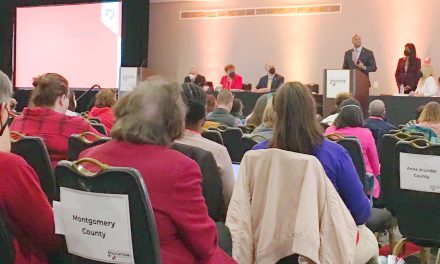Former Republican Howard County Executive Allan Kittleman announced Sunday he will be running for executive again, seeking a rematch with Democrat Calvin Ball who beat incumbent Kittleman in 2018 by 8,000 votes (52.8%).
In a five-minute video, Kittleman said, “These last few years we have seen our community go in the wrong direction. We’re more divided, we’re more taxed and more worried about our shared future.”
“Over the last several months, many Howard County residents have come to me expressing their deep disappointment, even sadness, over the direction our county has taken since 2018,” Kittleman said. “Right now, our community is splintering. Taxes are increasing, critical projects, including those to save historic Ellicott City, are lagging, and morale among our police officers is lower than I have ever seen.”
Kittleman said to “maintain the trust of every Howard County resident,” he will participate in the Citizens’ Election Fund, the new public financing method. He will not take donations from political action committees, lobbyists, political parties, and businesses, including developers, that do work with Howard County.
Will use public financing
There is some irony in Kittleman’s embrace of the Citizens Election Fund which limits contributions to $250 only from Howard County residents. The contributions are then matched by donations to the fund and appropriations of taxpayer dollars if needed.
Kittleman opposed the charter amendment creating the fund and vetoed the bill implementing the fund because he opposed using taxpayer dollars to match the voluntary contributions. His veto was overridden by the four Democrats on the County Council, which included Calvin Ball at the time.
In 2016, Kittleman told Maryland Reporter “There’s no question I support public financing of local campaigns,” but only if it comes from voluntary contributions, not tax dollars.
Kittleman, 62, grew up in Howard County and attended Atholton High School.
In addition to his one term as an executive from 2014 to 2018, Kittleman served 10 years in the Maryland Senate, succeeding his father Bob Kittleman after his death. He also served six years on the County Council prior to his appointment to the Senate. His stepmother Trent Kittleman is a member of the House of Delegates.
In a short conversation with Kittleman Saturday, he told Maryland Reporter that a key factor in deciding to run again is that he will be allowed to keep his job as a member of the Maryland Workers Compensation Commission, where he judges claims on worker injuries.
Kittleman said he cleared his candidacy with the State Ethics Commission as long as he does not campaign during office hours.
Kittleman, a lawyer with a practice in worker compensation issues, was appointed to the commission by Gov. Larry Hogan after his reelection defeat. His 12-year term on the commission ends in 2030.
Workers Compensation Commissioners are members of the executive branch but are paid the same as Maryland district court judges for their quasi-judicial role. The current salary of district court judges is $161,333.
By deciding to go with public campaign financing, Kittleman will have a small campaign chest compared to Ball. In January’s annual campaign finance report with the State Board of Elections, the Calvin Ball Team had $691,966 in the bank, raising $384,000 last year. Most of his largest contributors last year, including 25 checks for $6,000 each to the campaign, came from developers, contractors, and others doing business in the county.







Recent Comments